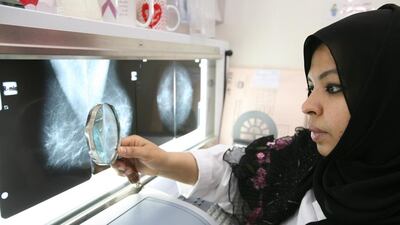ABU DHABI // Health chiefs have called for regular screenings to curb high rates of cancer.
“The only way we can tackle this is by addressing the problem at the core,” said Jalaa Taher, manager of non-communicable diseases at the Health Authority Abu Dhabi and a passionate advocate of cancer prevention.
"And to do this, it means both screening, so that we can catch cases early before they progress, and prevention, by changing lifestyle behaviours that can work as risk factors. This is how we can reduce cancer deaths in the long term."
The authority launched its Cancer Wave health promotion campaign on Tuesday, the first day of Breast Cancer Awareness month.
Figures presented at the launch of the campaign, which will run until March, showed a continuing trend of cancer being a leading cause of death in Abu Dhabi.
Last year it was the second leading cause of death after cardiovascular disease, accounting for 15 per cent of all deaths.
For expatriates alone, cancer is the third leading cause of death after cardiovascular disease and unintentional injuries.
The main five killer cancers for both sexes are breast (13.3 per cent), lung (11.8 per cent), blood (10.3 per cent), colorectal (9.8 per cent) and liver (8.6 per cent) out of a total of 407 deaths last year, which were distributed almost equally between men and women.
There were 1,729 new cancer cases reported in 2012, with the top five being breast, blood, colorectal, lymph node and thyroid gland cancers.
Dr Taher’s message was loud and clear. “Get checked and do it regularly,” she said. “Most people will go get checked and then sleep on it, but this is wrong. To truly benefit, the check-ups need to be regular and consistent.”
As part of the Cancer Wave, the authority is organising discounted or free screenings for the most common cancers.
It recommends that men and women between the ages of 40 and 75 are checked for colon and rectum cancer with a colonoscopy every 10 years or a stool test every two years; women 40 and above are checked for breast cancer with a mammogram every two years; and women between the ages of 25 and 65 are checked for cervical cancer with a pap smear every three to five years.
The average cost of a colonoscopy is between Dh2,000 and Dh3,000, a mammogram about Dh300 and a pap smear about Dh100.
However, the issue is not so much the cost of screening as motivating people to make the visit, Dr Taher said, and many programmes provided by Daman or healthcare facilities themselves already offered free or discounted screenings.
“It’s the fear that people have of the possible result, that’s what we need to work on,” she said.
Costs for screening is covered for eligible Emiratis through their Thiqa insurance and for expatriates by Daman’s enhanced plans.
Free screenings are also available for eligible expatriates at the National Screening Centre.
The authority also hopes to begin screening next year for lung cancer, the second major cause of cancer-related deaths. It will involve administering a low-dose CT scan to high-risk individuals between the ages of 55 and 79 who have smoked one packet of cigarettes a day for 30 years or two packs a day for 15 years.
According to the International Agency for Research on Cancer, which is part of the World Health Organisation, without pre-emptive measures the number of cancer deaths in the UAE will quadruple between 2008 and 2030, from 832 to 3,356. Similar trends would happen with the number of cancer cases, from 1,654 in 2008 to 5,914 in 2030.
“Most of the cases we are seeing now are only those who have already started having symptoms,” Dr Taher said. “This is why we need to take action now, so we don’t pay the tragic price later.”
Click here for a list of screening facilities and more cancer-related information.
mismail@thenational.ae

